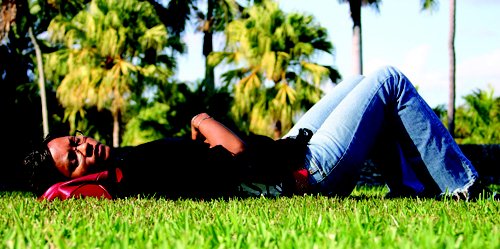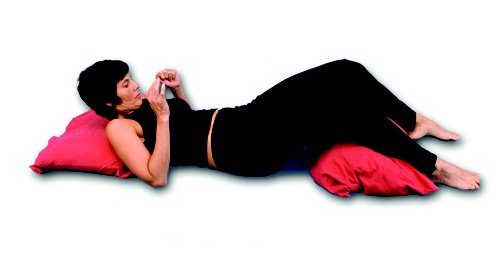Choosing a Bed
Students often ask me if there is a particular mattress that is in line with the Gokhale Method. While I do have a few suggestions, the most important part of lying down is how you do it. Stretchlying on your back or side to put some extra length in your back is key to navigating beds with any extra firmness or softness. Elongating the spine will also help mitigate the distortions caused by twisting and moving around in your sleep. If you learn how to use your body well, you will develop the ability to sleep and be comfortable on most surfaces.
While I do not endorse any particular brand or product, there are certain things to look for when purchasing a new mattress. What you most want from a bed is support and comfort—some structural element from the mattress to help you maintain your stretch, and some degree of softness that will cushion your contours. If you have any inflammation, disc degeneration, nerve compression or back discomfort, we favor a medium firm, high spring count mattress with a small amount of topper. The research shows that this is the most satisfactory for back pain. Here is why:
Firmness
When stretchlying on the back, if a mattress is too soft there will be too much sagging where your body is heavier, namely your hips, which will cause a sway. A high spring count will provide a structured even surface for your body to retain a stretch throughout the night.

You can lay comfortably on any surface if you have good structure.
Softness
Especially in stretchlying on the side, you want enough give to accommodate the discrepancy between a narrow waist and wider hips in women, or between narrow hips and broad shoulders in men. Some beds come with a pillow top, or you can place a soft topper on your medium firm mattress.

If your bed does not accomodate your curves well,
you can use a small pillow or flannel sheet to support your waist,
thus preventing any distortion to your spine.
High Quality
When choosing your bed, make sure the quality is there. High quality beds usually have a higher spring count and keep their original shape for many years. In less expensive, lower quality beds, the springs may start to protrude and/or the mattress may begin to sag after a few months.
A firm foam mattress works well but some foams vary in quality depending on where in the original manufacturing block (cube) they were cut from. If the foam is too soft you will get a sagging effect. Be wary of beds that are overly conforming. These types of mattresses allow your whole body to sink and curve your shoulders forward when you are lying on your back.

You can lay comfortably on any surface if you have good structure.
Travel Beds
If you are traveling or camping, I would go for an airbed or a Thermarest® pad. Airbeds provide a bit less leverage for lengthening your back in stretchlying. But as you get more proficient at stretchlying techniques, you are less dependent on the amount of firmness in your sleep surface. Thermarest pads, with their self-inflating cells, are surprisingly comfortable considering how little space they can pack into.
The bottom line is that if you are in pain, choose a bed with more structure. Otherwise, with your stretchlying skill set, you will be perfectly comfortable sleeping through the night on most sleeping surfaces.
Best,
Esther

Comments
Esther - I'm having trouble
Esther - I'm having trouble deciding what mattress to buy as several brands seem fine in the showroom when I tried them out.
I know you don't endorse products but I wonder which brand do you sleep on. Thanks.
Hazel
My mattress is a Naturally
My mattress is a Naturally Englander Laytex for what it's worth. It was bought decades ago (!) - they do last well. I must say that I often find the beds in various hotels / Airbnb's I sleep on even more comfortable than my own...
It's not quite accurate that I don't endorse products - I've never accepted a financial inducement to endorse a product, but I'll endorse anything I truly thnk is good!
An additonal tidbit: The last time I was in a large department store I tested and liked Sealy / Simmons Posturpedic beds. Of course they keep changing their names and products, so I don't know if this little piece of info is still useful. Best of luck!
Hello EstherI am wondering if
Hello Esther
I am wondering if you have ever tried sleeping in a hammock. I am a plumbing contractor and my work involves lots of movement and being able to get into some tight places. For many years I would wake up with low back pain (we have a latex matress). I had heard many others talk about the virtues of sleeping in a hammock and about a year ago I tried it out while on a camping trip and was amazed at the restful night's sleep I experienced.
For over a year now I have slept almost every night in a hammock. I feel like the even, continous support i get is unmatched by any bed I have ever tried. I now wake up with no low back pain at all.
When I think about the millions of people around the world that sleep and nap in hammocks I wonder why it has never caught on here in the states.
While I'm sure it's not for everbody, perhaps others might give it a shot to see if it helps relieve their back pain.
I have to agree. I slept in
I have slept on some random
I have slept on some random hammocks and wasn't charmed. I'll be on the lookout to give them another try. I tried arranging myself diagonally because I was told that's the way you get a straight line for your body. Couldn't quite make that work. Comments?
Add New Comment
Login to add commment
Login